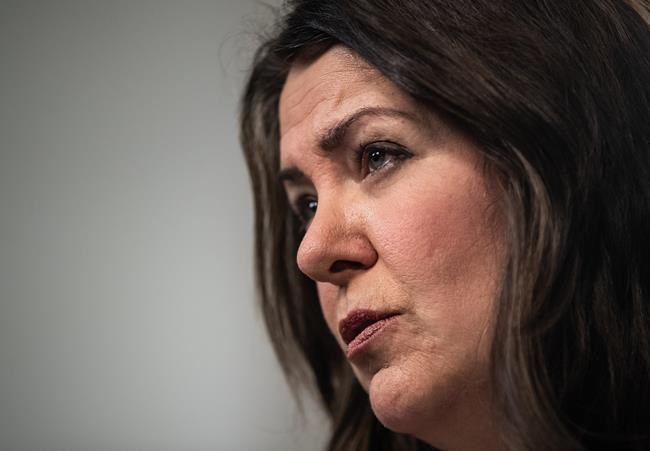Ottawa's proposed cap on greenhouse gas emissions from the oilpatch punishes Alberta's main industry and the province will take the measures to court, Premier Danielle Smith said Thursday.
"With this pronouncement, (Prime Minister) Justin Trudeau and his eco-extremist Minister of the Environment and Climate Change Steven Guilbeault are risking hundreds of billions of dollars of investment in Alberta's economy," she said from Dubai, where she's attending the COP28 climate meetings.
"They're devaluing the retirement investments of millions of Canadians and threatening the jobs of hundreds of thousands of Albertans."
Smith promised another court fight, saying Ottawa has again overstepped its jurisdiction.
"There's no question that if they continue on this path it will end up in court and I think we will win."
Smith and provincial Environment Minister Rebecca Schulz repeatedly singled out Guilbeault as intransigent.
"I hope Justin Trudeau replaces this minister. He's a menace to us, he's a menace to unity. He's clearly destructive."
Schulz compared the cap to a 1970s-era program that still evokes disdain in Alberta.
"This is the National Energy Program all over again," she said.Â
Under the program announced Thursday, the oil and gas industry will have to cut emissions by more than one-third by 2030 or buy offset credits. It requires a smaller cut to emissions than initially estimated in the government's emissions reduction plan last year.
The cap was promised by the Liberals in the 2021 election.
Guilbeault told The Canadian Press that the plan was developed after extensive consultation with industry and other stakeholders to make sure it is achievable and won't risk losing to a constitutional challenge.
But Schulz said the federal plan is based on false assumptions.
"Their production growth assumptions are false. Their technology assumptions are false.
"Their talking points that this is an emissions cap and not a production cap, that is absolutely 100-per-cent false."
Alberta already has a 100-megatonne emission cap for the oilsands. That legislation was never enacted by the previous New Democrat government but it has never been withdrawn by the United Conservatives.Â
Two online polls conducted in August by different companies asking the same questions found that a slim majority of Albertans favour some kind of cap on oil and gas emissions.Â
Leger found 57 per cent of respondents were at least somewhat in favour. Research Co.'s finding was 62 per cent in favour.Â
Online polls do not report margins of error.Â
On Thursday, Smith dismissed those findings.
"If you asked Albertans, 'Do you want your production shut in so that you lose 1.2 million barrels a day of production and reduce revenues by $6.5 billion year?' I suspect you'd get a very different answer."
In 2022, Alberta government figures say the province averaged about 3.3 million barrels a day.
Opposition New Democrat Energy critic Kathleen Ganley said it's possible to fight climate change and protect Alberta's economy at the same time.Â
"The petty dispute between the federal and provincial governments means we are failing at both," she said in a statement.Â
"Rules that amount to a cap on production rather than a cap on emissions, are not rules that are good for the cost of living or economic stability. Still, we know that having a realistic cap is important and industry has set their own reductions targets."
University of Alberta energy economist Andrew Leach said having special rules for one industry on top of carbon prices, incentive programs and other measures could make things unnecessarily complex for companies trying to make investment decisions.Â
"The types of investments you want people to make, they're going to have a challenging time making them because they won't be able to value them."
Leach said most emissions still come from fossil fuel consumption, not production, and a gradually increasing, universally applied carbon tax remains the most efficient tool.Â
He suggested Ottawa is on relatively firm Constitutional grounds. Although Alberta may argue the cap is a backdoor attempt to manage oil and gas, the Supreme Court has ruled previously that the federal government has the right to manage toxic emissions.
"The smart betting money is on the side of the federal government," he said.Â
The Canadian Energy Regulator says Alberta's greenhouse gas emissions increased 19 per cent between 2005 and 2020, the only Canadian jurisdiction where such releases have grown. More than half of Alberta's emissions come from oil and gas production.Â
— With files from Mia Rabson in Ottawa
This report by The Canadian Press was first published Dec. 7, 2023.
Bob Weber, The Canadian Press




